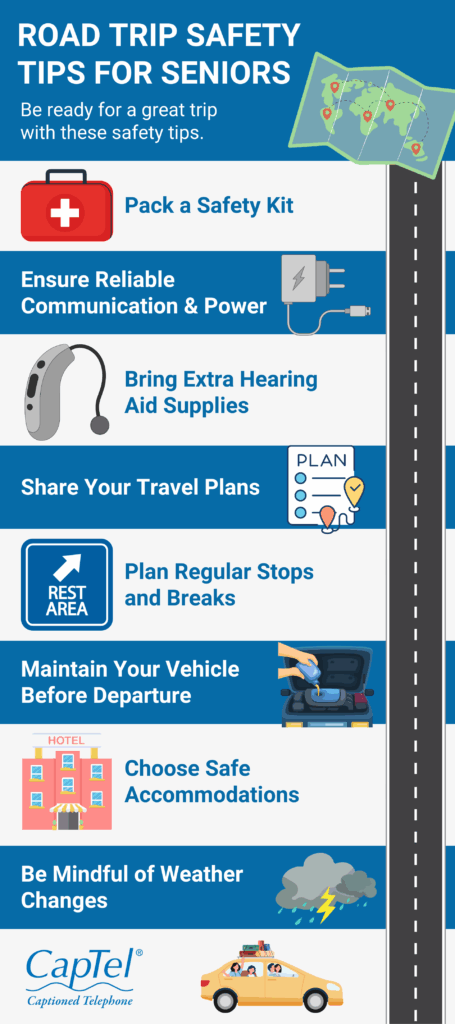If you’re taking off on the road this fall, here are some safety tips for a great trip.

Fall road trips offer spectacular scenery, comfortable temperatures, and wonderful opportunities to explore new places or visit friends and family. The changing leaves create breathtaking backdrops for memorable adventures, while cooler weather makes driving more comfortable than summer heat or winter storms. Let’s take a look at some road trip safety tips so you can feel prepared and excited for your journey.
Pack Your Essential Safety Kit
A well-stocked safety kit provides peace of mind and practical solutions for common road trip situations. Include basic tools like jumper cables, a tire pressure gauge, emergency flares, and a flashlight with extra batteries. These items help address minor vehicle issues that might otherwise derail your travel plans or require expensive roadside assistance calls.
Emergency supplies should also include a first aid kit with any personal medications, bottled water, non-perishable snacks, and warm blankets. Consider including important documents in waterproof containers: insurance cards, vehicle registration, emergency contact information, and copies of identification. Having these readily available speeds assistance if you need help and ensures you have essential information even if your wallet gets misplaced during travel activities.
Ensure Reliable Communication and Power
Portable chargers and car charging adapters keep your communication devices functional throughout your entire journey. Modern smartphones provide navigation, emergency communication, and access to roadside assistance, making reliable power sources crucial for travel safety. Pack charging cables for all devices and consider backup power banks that can recharge phones multiple times.
Stock Extra Hearing Aid Supplies
Be sure to come prepared with any hearing aid devices you may need. Hearing aid batteries can drain unexpectedly. Pack more replacement batteries than you think you’ll need, storing them in cool, dry places away from direct sunlight or vehicle heat, or bring a charger that can plug into your vehicle. You may find that temperature fluctuations during road trips affect battery life differently than your normal routine.
Consider packing written communication cards that explain your hearing loss and communication preferences. These cards help in situations where background noise, poor lighting, or car trouble might make communication more challenging than usual. Having backup communication strategies reduces anxiety and ensures you can get help when needed.
Share Your Travel Plans with Trusted People
Detailed itineraries help family members and friends know where you are and when to expect contact from you. Share your planned route, overnight stops, and expected arrival times with trusted contacts who can alert authorities if you don’t check in as planned. Include contact information for hotels or destinations where you’ll be staying along the way.
Be sure to update your trusted contacts about any route changes or schedule modifications that occur during your trip. Consider using location-sharing features on smartphones that allow trusted family members to track your progress in real-time. These features provide peace of mind for travelers and family.
Plan Regular Rest Stops and Breaks
Frequent breaks improve driving safety and travel enjoyment while preventing fatigue that can lead to accidents or poor decision-making. These breaks provide opportunities to stretch, hydrate, use restrooms, and refresh your focus for continued safe driving. Try to stop every few hours for a recharge; you can even plan in scheduled stops at scenic overviews, historic landmarks, restaurants or comfortable rest stops.
Maintain Your Vehicle Before Departure
Pre-trip vehicle maintenance prevents many roadside emergencies that can derail travel plans or create safety concerns. Check tire pressure, tread depth, and overall tire condition before departure. Ensure your spare tire is properly inflated and that you have the necessary tools for tire changes.
Verify that all car fluids, like engine oil, coolant, gas, and windshield washer liquid, are at proper levels. Consider a quick car wash to ensure your windows are clean and free of obstructions.
Choose Safe and Comfortable Accommodations
Research overnight stops in advance to ensure safe, comfortable lodging that meets your needs and preferences. Read recent reviews from other travelers, especially those mentioning accessibility, noise levels, and overall safety.
Navigate Weather Changes Safely
Fall weather can change rapidly, affecting driving conditions and travel safety throughout your journey. Monitor weather forecasts for your entire route and be prepared to adjust plans based on predicted conditions. Pack appropriate clothing for temperature variations you might encounter at different elevations or geographic regions.
Road trips offer wonderful opportunities for adventure, exploration, and creating lasting memories. Thoughtful preparation ensures your focus stays on enjoying beautiful destinations rather than worrying about safety concerns or unexpected challenges. With these helpful tips for road trip safety, you’ll be ready for anywhere the road takes you! For more helpful tips, visit the CapTel blog.


